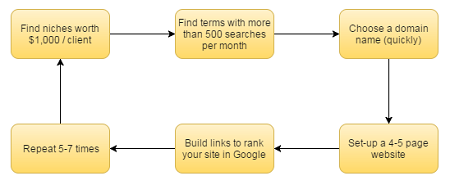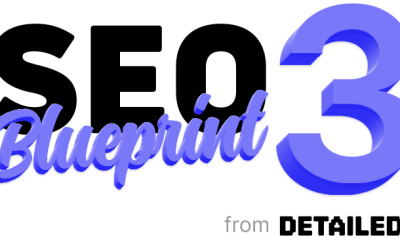🌟 New Year Offer 🌟
Celebrate 2026 with 30% OFF on all products! Use code: NEWYEAR2026. Hurry, offer ends soon!
In 2015 my business generated over $1.4m in online revenue by ranking websites highly in Google.
The Rank & Rent Model by Glen Allsopp of ViperChill

“How to generate huge online profits in less than four weeks using the Rank & Rent model”
Written by Glen & Diggy
In 2015 my business generated over $1.4m in online revenue by ranking websites highly in Google.
Many of these websites were rented to other businesses who could profit from the traffic they received.
Here is my six-step process to following the same business model and being profitable with it in under four weeks.
Step #1: List everything you’ve spent more than $1,000 on
When I say everything, I really mean everything.
Car insurance (and your car), your mortgage, your college education, your last vacation; the lot.
We do this because you need a list of industries in which companies make over $1,000 per every client they get.
If we can get these companies an extra lead each month, then they can afford to pay us, at minimum, a few hundred dollars for that lead.
Some of these industries are going to be obvious, such as real estate developers, and therefore competitive.
It’s imperative that you start thinking of industries “outside of the box.”
Pool resurfacing in any US state can cost between $5,000 and $15,000.
A conservatory being built in the UK can easily cost in excess of $5,000 as well.
I imagine those two things aren’t likely to have been on your list, so now you have to expand it
You need a client to your client to be worth $1,000 because you’re going to be sending them their next client
If they only make $50 per sale then we’re going to have to send them hundreds of leads before they can pay us $500 – $1,000 per month.
If they make enough money per lead, they can pay us $1,000 just for one.
If you’re struggling for ideas start to think of things family, friends and people in your neighbourhood have spent more than $1,000 on. The weirder and more obscure it is, the better.
Step #2: Invest time to perform keyword research
Keyword research allows you to see which terms people search Google for when looking for a product or service.
This is important because we don’t want to rank our websites for something that people don’t actually search for.
It’s better to rank for ‘pool resurfacing Florida’ then it is ‘pool resurfacing London’ because the number of pools in the latter location is minimal.
The minimum times a term or phrase must be searched for is 500 times per month.
If you’re just starting out, don’t target terms searched for more than 5,000 times per month.
They’re far more likely to be competitive and thus take more time and effort to rank for.
500 minimum searches is not an arbitrary number.
Your goal should be to rank in the top 3 search results in Google for your chosen search term.
If you rank third in Google you will receive around 7.22% of clicks. Meaning, if 100 people search for something, around seven of them will land on your website.
If 500 people search for something, 36 people will land on your website.
This means you need to get one of those 36 people per month to buy what it is that you’re offering.
The beauty of Google traffic is that the visitor to your site is highly-targeted. They’re already searching for what you have to offer.
Additionally, Google rewards websites with ‘long-tail’ traffic which will increase the number of people finding your website.
For instance, let’s say you wish to rank for ‘Yacht Rental Miami’. If you optimise your site for this term, you’ll also find it ranking for terms like:
- Rent a yacht in Miami
- Miami yacht rental prices
- Where to rent a yacht in Miami
These terms all receive less than 500 searches per month, but they will add to your overall traffic.
The most common place to find search volumes for Google’s own Keyword Planner.
Unfortunately, in recent weeks (literally August 2016), Google have made changes which only show detailed numbers to those who have spent a lot of money on their Adwords Platform.
If this is you then you’ll already know about the tool and be able to use it.
If this is not you then, fortunately, there are other alternatives
It only allows you to perform two free searches per day, but does show 1,000 suggestions per keyword.
If you change browser or clear your browser cookies, you’ll be able to continuing performing searches for free (though please do consider a premium account if you use it extensively).
Enter a broad search query – such as ‘yacht rental’ – based on your list from step one and then note terms with between 500 and 5,000 search volume.
My Own $350,000 “Overnight Success”
(And how I totally messed up when trying to duplicate that)
Over the last few years I launched two software products.
Both cost around $6,000 to develop.
Both targeted bloggers.
I marketed both to the same audience in the same way.
And both allowed you to easily customise an element of your blog (your opt-in form or your most popular posts).
Yet one of them stayed on the top of Clickbank’s web design category for 3 years and generated more than $350,000 in revenue while the other barely made back the cost of development.
Crazy, right?
Well, not so much when you understand the power of the angle you take.
For the second product, I had got it all wrong.
With the opt-in form plugin I was solving a problem that people had; there was no other way to easily customise and add opt-in forms to your blog back then.
With the popular-posts plugin I was simply giving people a more attractive solution to something they could already do.
I got the angle wrong, and the sales showed.
I tell you this story because I want you to just jump in any way.
I’ve helped hundreds of people quit their day job and make a living online, but I’ve failed to help tens of thousands more.
The failures always seem to have one thing in common: They over-analyse every single opportunity and end up talking themselves out of something before they even get started.
I did not get lucky when I made my WordPress plugin that generated more than $300,000. I had to have the idea. I had to build it.
Similarly, I did not get lucky when I made over $1M from this business model last year. I believed in it, and myself, and took action.
Step #3: Choose a domain name (and fast)
I would prefer to put this as a single sentence, rather than a step, but I can’t do that.
The reason why is because I get asked about which domain to choose more than any other question when it comes to the rank and rent model.
Let me just say before I get into more detail: It matters 1% as much as you think it does.
After all, you’re reading this on a website called ViperChill.com.
What does ViperChill mean? Absolutely nothing. It has zero context in the internet marketing world, yet I still have an email subscriber list of over 100,000 people who follow the brand.
If that doesn’t show you how little your domain matters, then nothing will.
That being said, choosing a domain for the R&R model is different to choosing one for a blog.
A blog should be brandable and ‘clean’, whereas R&R should be more relevant and it doesn’t have to be brandable.
My rule for choosing a domain is generally this: Pick something with one word from your chosen keyphrase and one to do with marketing and / or services.
For example, if I’m in the Yacht Rental niche then I’ll choose a name like YachtRank or YachtingMiami.
While exact-match domains (yachtrentalmiami.com) do still have some weight in Google, it’s decreasing over time and it’s generally better to stay away from them.
I recommend only getting a .net or .com domain unless you’re trying to focus on a country-specific ranking.
For example, .co.uk, .com.au or .ca are acceptable if you’re focused primarily on the UK, Australia or Canada.
If you spend more than 30 minutes deciding on a domain name then you’ve already spent 25 minutes too long.
Over analyse this step and you’ll over-analyse everything, which will lead to no action.
I want you to take action, so trust me on this one.
Step #4: Set-up a very basic website
The websites I build to rank and rent consist of 4-5 pages.
Three of those pages are incredibly straight-forward (and fast) to put together. They are:
- An About page
- A Contact page
- A Privacy Policy page
The Privacy Policy page is generated in seconds by http://privacypolicygenerator.com.
Just copy the results to a new page on your website.
My About page on each website is basically a 200-300 word ‘blurb’ of why I put the website together and who it’s for. Keep in mind that it’s unlikely this will ever be read, so don’t worry about spelling or grammatical mistakes.
Just make sure you write it yourself, so it’s unique.
There’s no excuse to having plagiarised or computer-generated content on a website that’s so small.
My Contact page is as equally simple as the Privacy Policy page, where I use a plugin like ‘Contact Form 7’ so website visitors can get in touch.
Your contact form does not have to work until your website is actually ranking.
It’s simply one of those things you should have in place to make your website appear to be a real, legitimate business.
That’s three of the five pages taken care of.
Page number four is your homepage.
This should be a page which you fill with at least 500 words of content, but preferably more than 1,000.
You can either outsource this for around $10 to someone on Upwork.com or write it yourself.
I prefer to write the content here myself (honestly) as it makes me feel like I’ve made more of an investment in the site rather than just putting up some shell, and I’m more likely to want to make it rank.
Once again, the content here is not really designed to be read by anyone. It’s simply there to make your website appear to be a ‘normal’ website, and normal websites have content on them.
I write about the niche I’m in, what my website is designed to do and who it’s for.
There is a lot of rambling, not unlike this page – heh – but it’s relevant to my niche.
Write the page for people, not search engines.
Ignore anything you may have read about ‘Keyword Density’ or ‘over-optimisation’. Just write for people and you’ll be fine.
The final page I add to the site is basically the same thing again. Another 500-1,000 words on the service or industry I’m focused on. Whether that’s yachting, pool resurfacing or office rental in New York.
Unlike the other pages I’ve discussed, this is optional. I just think it’s better to have 2,000 words on a website than 1,000, and that’s why I add it.
Step #5: Build backlinks to rank your website in Google
Have you ever wondered why one site ranks 10th in Google and another ranks 1st?
Does someone at Google just prefer that website?
Is one website newer than the other one?
Does one have more content?
With billions upon billions of pages in Google’s search results, I can assure you that they are not being ranked manually.
They literally couldn’t be.
Consider this: 20% of Google searches performed every single day have never been searched for before in the history of Google.
Quite incredible isn’t it?
Almost unbelievable, until you think of all the world events that happen on a daily basis.
For instance, people have just been performing billions of queries about the 2016 Rio Olympics and the results for various events.
Of course they hadn’t been searched for before: The events hadn’t happened yet.
So how does Google determine who deserves to rank for queries about Michael Phelps’ medal tally?
While I don’t want to entirely over-simplify how Google works, the core component of their ranking algorithm is backlinks.
Backlinks are links from one website to another.
Essentially, the websites ranking on page one of Google typically have more backlinks than the websites on page two of Google.
In other words, they got more websites to link to them and thus Google views the result as being more important.
I’ve embedded a 10-minute video for you below if you would like to learn more about how this works.
Sale Page : http://www.viperchill.com/playbook/
Course Features
- Lecture 0
- Quiz 0
- Duration Lifetime access
- Skill level All levels
- Students 0
- Assessments Yes





